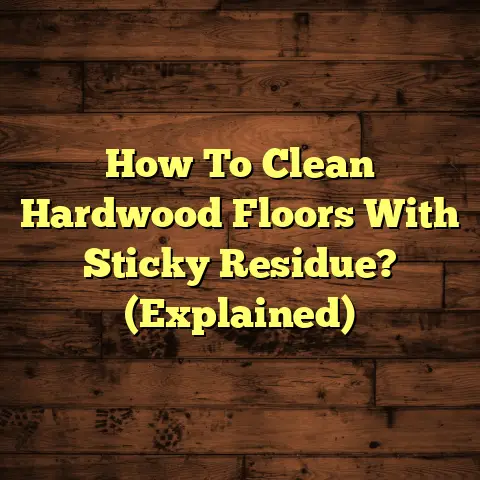What Is Best For Garage Flooring? (Explained)
Did you know that the average garage floor can endure over 5,000 pounds of weight? That’s a staggering amount. Yet, many homeowners overlook the importance of a well-finished garage floor. As someone who’s spent years in the flooring industry, I can tell you that choosing the right flooring for your garage isn’t just about aesthetics; it’s about functionality, durability, and even safety.
Why Garage Flooring Matters
When I first started installing garage floors, I was surprised by how much the choice of flooring could impact the overall experience of using that space. A garage serves many purposes: it’s a workshop, a storage area, and sometimes even a gym. The right floor can make all the difference in how you utilize that space.
Understanding Your Garage Environment
Before diving into the specifics of different flooring options, it’s essential to understand the environment of your garage. Garages can be exposed to moisture, oil spills, heavy equipment, and extreme temperatures. This environment can affect the longevity and performance of your flooring choice.
Moisture Considerations
One significant factor I’ve encountered is moisture. In certain climates, garages can become hotspots for humidity, leading to mold and mildew problems. During one particular job, I noticed water pooling in a client’s garage after heavy rains. It prompted me to recommend an epoxy coating with moisture barriers to protect the underlying concrete slab.
Temperature Extremes
Another consideration is temperature. In colder regions, garages may experience freezing temperatures, which could lead to cracks in certain types of flooring over time. On the flip side, excessive heat can warp materials if they aren’t designed to withstand high temperatures.
Options for Garage Flooring
Over the years, I’ve worked with various types of garage flooring materials. Here’s a deeper breakdown of what I’ve discovered:
Concrete
Concrete is often the default choice for garages. It’s durable and can handle heavy loads without breaking down.
- Installation: If you’re pouring new concrete, make sure to hire professionals for a smooth finish. I once tried to pour a small patch myself—it didn’t go well. The texture was uneven, and it took twice as long to fix it.
- Maintenance: Sealing concrete is crucial. I learned this the hard way when oil stains from my car seeped into the floor, creating a permanent mark. Regular sealing can prevent this.
- Cost: Expect to spend around $3 to $5 per square foot for concrete installation, depending on your location and if you need to prep the existing slab.
- Durability: Concrete floors are incredibly sturdy but can crack if not properly maintained. I once had a client who ignored small cracks until they turned into significant issues needing extensive repairs.
Epoxy Coatings
If you want something more visually appealing, epoxy coatings are a great option.
- Installation: Applying epoxy can be a DIY project, but in my experience, getting the surface prep right is key. I remember rushing through the cleaning process on one job, and it led to peeling a few months later.
- Maintenance: Epoxy is relatively easy to clean. A simple mop with soapy water usually does the trick. However, if you allow spills to sit too long, they can become challenging to remove.
- Cost: The cost ranges from $2 to $12 per square foot based on quality and color options. I generally recommend clients not skimp on quality because it can save money in the long run.
- Durability: Epoxy is resilient and resistant to most chemicals, making it ideal for garages that see a lot of automotive work or storage of hazardous materials.
Vinyl Flooring
Vinyl flooring can provide a softer feel compared to concrete or epoxy.
- Installation: I’ve installed vinyl sheets and tiles in garages and found that they’re surprisingly straightforward. Just ensure the subfloor is smooth. Some clients prefer interlocking tiles for easier installation and replacement.
- Maintenance: Spills clean up easily, but watch out for sharp tools as they can puncture the surface. I once had a client who dropped a heavy tool on their vinyl floor; it created an unsightly tear that required immediate replacement.
- Cost: Vinyl typically costs between $1 to $5 per square foot.
My Experience with FloorTally
When it comes to estimating costs for these various flooring options, FloorTally has been an invaluable tool. It pulls local material and labor rates, allowing me to present clients with accurate budgets right from our initial discussions.
Imagine working on a project where the client wants an epoxy floor but isn’t sure how it fits into their budget. With FloorTally, I can quickly show them various options based on their preferences. It’s made my conversations more transparent and trustworthy.
I remember one specific instance where a client was torn between two different epoxy finishes—one was more expensive but offered superior durability. Using FloorTally’s estimates, we were able to break down the long-term costs vs. short-term savings effectively.
Pros and Cons
Concrete
- Pros: Extremely durable and easy to maintain.
- Cons: Can crack over time if not properly sealed.
Epoxy Coatings
- Pros: Visually attractive and resistant to stains.
- Cons: Requires proper installation; otherwise, it won’t last.
Vinyl Flooring
- Pros: Comfortable underfoot and easy to install.
- Cons: Less durable compared to concrete or epoxy.
Challenges Faced
One project stands out in my mind—installing an epoxy floor in a poorly ventilated garage during summer. The heat caused the epoxy to cure too quickly, leading to bubbles in the finish. It took hours of extra work to fix that mistake.
In another instance, I helped a friend convert his garage into a gym. We opted for vinyl flooring because he wanted something softer underfoot. However, we didn’t account for heavy gym equipment placements. After a few weeks of use, we noticed some wear and tear. I suggested adding mats under those areas for extra protection.
Tips for Choosing Garage Flooring
- Assess Your Needs: What will you primarily use your garage for? If it’s mainly for parking, durability is key.
- Consider Moisture Levels: If your garage has moisture issues, avoid materials that can trap water like certain vinyls.
- Test Before You Commit: If possible, get samples of different flooring options and see how they hold up in your space.
- Plan for Maintenance: Consider how much time you’re willing to dedicate to keeping your floor looking good.
- Think About Aesthetics: Your garage doesn’t have to be just functional; think about how you want it to look too!
Installation Process
Regardless of what type of flooring you choose, proper installation is essential.
- For concrete, ensure that it’s cured properly before applying any sealants or coatings.
- With epoxy, follow the manufacturer’s instructions closely regarding temperature and humidity levels during application.
- For vinyl, make sure your subfloor is clean and dry before laying down any materials.
Maintenance Tips
After installation comes maintenance—an often overlooked aspect of garage flooring. Here are some practical tips based on my experience:
Concrete Maintenance
- Seal Regularly: Aim to reseal every couple of years.
- Clean Spills Immediately: Don’t let oil or other chemicals sit.
- Use Floor Mats: They can provide an extra layer of protection against stains.
Epoxy Care
- Avoid Abrasive Cleaners: They can scratch or dull your floor.
- Sweep Regularly: Dirt can act like sandpaper over time.
- Inspect for Damage: If you notice bubbling or peeling, address it immediately.
Vinyl Upkeep
- Use Gentle Cleaners: Harsh chemicals can degrade the material over time.
- Replace Damaged Tiles Promptly: They’re easy to replace if you have extras on hand.
- Keep It Dry: Excess moisture can lead to mold growth under your vinyl.
Conclusion: Making the Right Choice
Ultimately, the best flooring for your garage boils down to your specific needs and how you plan to use that space. Each option has its own set of advantages and challenges.
As someone who has navigated through multiple flooring projects over the years, I find that the choice often comes down to balancing cost with functionality and aesthetics. Ask yourself what you value most—durability, ease of maintenance, or maybe even looks?
By considering these factors along with personal experiences, I believe you’ll be better equipped to make an informed decision about your garage flooring.
Comparative Analysis of Garage Flooring Options
To further aid your decision-making process, here’s a comparative analysis of popular garage flooring options based on various criteria:
| Criteria | Concrete | Epoxy Coatings | Vinyl Flooring |
|---|---|---|---|
| Durability | High | Very High | Moderate |
| Cost | $3-$5/sq ft | $2-$12/sq ft | $1-$5/sq ft |
| Maintenance | Low (if sealed) | Low | Moderate |
| Aesthetic Options | Limited | Wide | Wide |
| Installation Difficulty | Moderate | Moderate | Easy |
| Comfort | Hard | Hard | Soft |
As you can see from this table, each option has strengths and weaknesses depending on your specific needs and preferences.
Final Thoughts
Choosing the right garage flooring involves careful consideration of multiple factors from aesthetics to functionality and cost-effectiveness. My journey through various flooring installations has taught me that no two projects are alike; each comes with its unique set of challenges and rewards.
As you venture into selecting your garage flooring, remember that it’s not just about choosing a material—it’s about enhancing your overall experience in that space. Whether you’re working on cars, storing tools, or turning your garage into a hobby workshop, the right choice will make all the difference in how you enjoy and utilize your garage for years to come!





